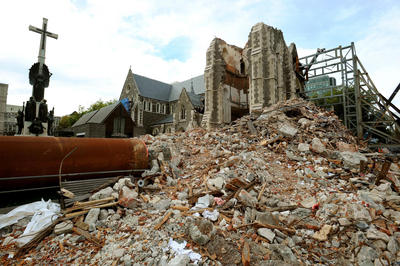The big news is the Christchurch earthquakes: a jab-cross combination that has floored the city and its economy. The latest NZIER research suggests a 1 per cent decline in first quarter 2011 national GDP from the earthquakes.
From the rubble, many moving stories about the earthquakes and their aftermath have emerged; but from the economy’s point of view, two are important.
First, everything is harder. Daily life and ordinary economic activity are disrupted, and will be for some time. For example, several supermarkets are still closed, forcing the same number of shoppers into fewer stores. Some schools are running in shifts, so that they can accommodate pupils from closed schools.
Second, running the Earthquake Commission (EQC) and the Canterbury Earthquake Recovery Authority (Cera) effectively is essential. To restore normal economic activity, businesses need premises, access to records, finances, telecommunications, supply chains, transportation, insurance and the like. This means they have been finding that, somewhere in this mix, they have to deal with the EQC. So the EQC, and now Cera, set the tone and pace for the recovery.
What does this mean for the national economy? If it were normal times, probably not that much. But these are not normal times. The economy is flirting with contraction every quarter, and a 1 per cent drop in GDP could be enough to push it over the edge and into recession.
The wider economy will react to three things.
First is momentum. Whether you take a real business cycle view or a Keynesian view, the economy needs forward momentum to keep growing. It is difficult to ‘turn the corner’ and get things moving. NZIER’s analysis over the last two years suggests that there is very little momentum in the economy. Businesses intend to increase activity and hiring but they have been unable to do it. It looks like the economy needs some external prodding to get it moving.
Second is policy. The economy is sluggish because people are not spending. The Savings Working Group (SWG) wrung its hands over the low savings rate amongst New Zealanders, and the consequent shallow capital market and poor retirement planning. In the recession, households increased savings by about 2 per cent of GDP, just as the SWG wanted. But with all that saving, who is spending? It certainly isn’t the government, which has chosen this moment to push its own austerity program, with plans to cut public services and shrink the government.
Third is recovery management. With consumers sitting on their hands and the government cutting back, the earthquake recovery is one thing that can pull the economy out of its funk. New Zealand is receiving a huge injection of overseas cash from insurance payouts, which will boost current production. But money isn’t enough. The way the recovery is managed — how long it takes to process claims, how many claims are disputed, how fair and transparent the recovery appears — will be just as important for the mood of Christchurch and therefore the country.
This situation represents a challenge and an opportunity for the Key government. The economy isn’t going to start moving by itself anytime soon, so it has to be prodded into action. In an election year, Key has chosen to pursue austerity measures for most of the country, but the Christchurch recovery needs a good measure of generosity and forbearance.
The challenge is to keep austerity from increasing consumer frugality and overwhelming the weak recovery. The opportunity is that spill-over effects from the regional recovery effort can get some momentum into the economy using overseas money. By ring-fencing his generosity to his native Christchurch, Key could be expansionary and austere at the same time.
Dr Bill Kaye-Blake is Principal Economist at the New Zealand Institute of Economic Research, Wellington.

